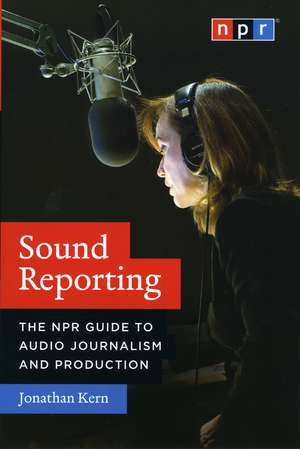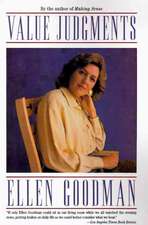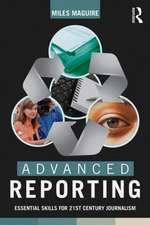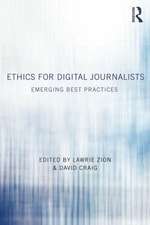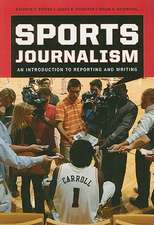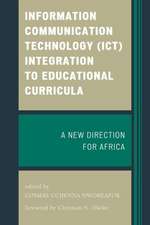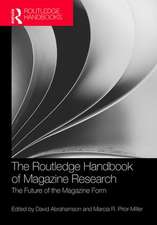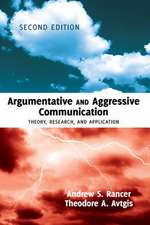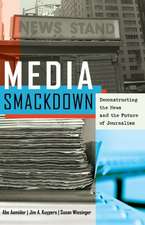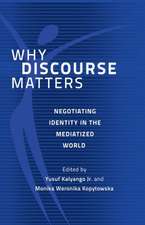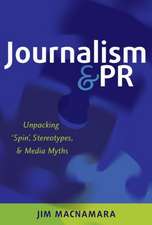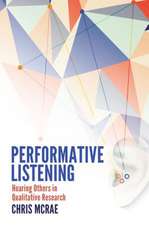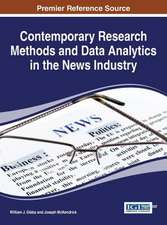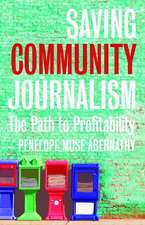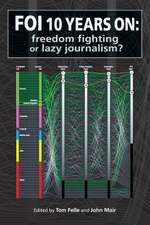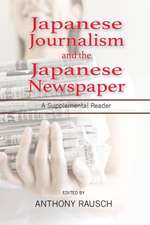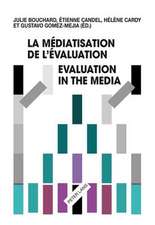Sound Reporting: The NPR Guide to Audio Journalism and Production
Autor Jonathan Kernen Limba Engleză Paperback – iul 2008
Perhaps you’ve always wondered how public radio gets that smooth, well-crafted sound. Maybe you’re thinking about starting a podcast, and want some tips from the pros. Or maybe storytelling has always been a passion of yours, and you want to learn to do it more effectively. Whatever the case—whether you’re an avid NPR listener or you aspire to create your own audio, or both—Sound Reporting: The NPR Guide to Audio Journalism and Production will give you a rare tour of the world of a professional broadcaster.
Jonathan Kern, who has trained NPR’s on-air staff for years, is a gifted guide, able to narrate a day in the life of a host and lay out the nuts and bolts of production with equal wit and warmth. Along the way, he explains the importance of writing the way you speak, reveals how NPR books guests ranging from world leaders to neighborhood newsmakers, and gives sage advice on everything from proposing stories to editors to maintaining balance and objectivity. Best of all—because NPR wouldn’t be NPR without its array of distinctive voices—lively examples from popular shows and colorful anecdotes from favorite personalities animate each chapter.
As public radio’s audience of millions can attest, NPR’s unique guiding principles and technical expertise combine to connect with listeners like no other medium can. With today’s technologies allowing more people to turn their home computers into broadcast studios, Sound Reporting couldn’t have arrived at a better moment to reveal the secrets behind the story of NPR’s success.
Jonathan Kern, who has trained NPR’s on-air staff for years, is a gifted guide, able to narrate a day in the life of a host and lay out the nuts and bolts of production with equal wit and warmth. Along the way, he explains the importance of writing the way you speak, reveals how NPR books guests ranging from world leaders to neighborhood newsmakers, and gives sage advice on everything from proposing stories to editors to maintaining balance and objectivity. Best of all—because NPR wouldn’t be NPR without its array of distinctive voices—lively examples from popular shows and colorful anecdotes from favorite personalities animate each chapter.
As public radio’s audience of millions can attest, NPR’s unique guiding principles and technical expertise combine to connect with listeners like no other medium can. With today’s technologies allowing more people to turn their home computers into broadcast studios, Sound Reporting couldn’t have arrived at a better moment to reveal the secrets behind the story of NPR’s success.
Preț: 133.00 lei
Nou
Puncte Express: 200
Preț estimativ în valută:
25.45€ • 26.29$ • 21.18£
25.45€ • 26.29$ • 21.18£
Carte disponibilă
Livrare economică 04-18 martie
Livrare express 15-21 februarie pentru 48.42 lei
Preluare comenzi: 021 569.72.76
Specificații
ISBN-13: 9780226431789
ISBN-10: 0226431789
Pagini: 380
Dimensiuni: 152 x 229 x 28 mm
Greutate: 0.53 kg
Editura: University of Chicago Press
Colecția University of Chicago Press
ISBN-10: 0226431789
Pagini: 380
Dimensiuni: 152 x 229 x 28 mm
Greutate: 0.53 kg
Editura: University of Chicago Press
Colecția University of Chicago Press
Notă biografică
Jonathan Kern is the executive producer for training at NPR. He has worked in almost every position in radio news, including executive producer of All Things Considered.
Cuprins
FOREWORD
PREFACE
1 SOUND AND STORIES
2 FAIRNESS
Fair, Accurate, Complete, and Honest | The Echo Chamber | Verifying Assertions | Getting Both Sides | Avoiding Loaded Language
3 WRITING FOR BROADCAST
Write the Way You Speak | How to Sound Like a Real Person | Other Newswriting Tips
4 REPORTING
The Reporter's Personality Skills | Developing News Sources | Other Sources of Original Stories | Getting People on Tape | Getting Great Actualities | Working on Tight Deadlines | Beyond Acts and Tracks | A Storytelling Sampler
5 FIELD PRODUCING
Getting Started | In the Field | Finding Sound and Scenes | Putting the Story Together | Filing from the Field | Taking Responsibility
6 STORY EDITING
The Editor's Role | The Ingredients of a Story | Structuring the Story | Editing by Ear | The Intro | The First Track | Copyediting | The Ending | When to Stop Editing | Finding New Approaches to Old Stories
7 THE REPORTER-HOST TWO-WAY
The Problem with Scripted Two-Ways | Going Scriptless | Two-Way Tips
8 READING ON THE AIR
Sounding Conversational | Marking up a Script | Getting Physical | The Need for Feedback
9 HOSTING
The Host's Day | The Host Interview | Reading Scripts Other People Write | Hosting Live Programming
10 NEWSCASTING
What Is News? | Public Radio Newscast Values and Principles | Composing the 'Cast | Newscast Writing | The NPR News Spot | The Reporter Q&A | On the Air
11 BOOKING
Booking Well-Known People | Booking Everyday People | The Booker as Detective | The Pre-interview | Final Steps
12 PRODUCING
Finding and Pitching Stories | Producing Interviews | Editing Interviews | Mixing Reporter Pieces | Producing Music Pieces
13 PRODUCTION ETHICS
The Unkindest Cuts | Other Production Issues
14 PROGRAM PRODUCING
The Art of the News Program | Creating the Lineup | Producing Live Programs
15 PROGRAM EDITING
Setting the News Agenda | Error Checking | Massaging the Script | Sitting In on Interviews | The Editor as Manager
16 COMMENTARIES
Finding Commentators | Topical Commentaries | Personal Commentaries | Editing Commentaries | Coaching Commentators | Commentary Intros | To Comment or Not to Comment
17 STUDIO DIRECTING
The Director as Number Cruncher | The Director as Conductor | Directing Live Events | The Joy of Directing
18 BEYOND RADIO
The Web-Radio Relationship | The Manifold Media of the Web | Podcasting | Editorial Issues Online | The Future
APPENDIX I. GLOSSARY
APPENDIX II. PRONOUNCERS
INDEX
PREFACE
1 SOUND AND STORIES
2 FAIRNESS
Fair, Accurate, Complete, and Honest | The Echo Chamber | Verifying Assertions | Getting Both Sides | Avoiding Loaded Language
3 WRITING FOR BROADCAST
Write the Way You Speak | How to Sound Like a Real Person | Other Newswriting Tips
4 REPORTING
The Reporter's Personality Skills | Developing News Sources | Other Sources of Original Stories | Getting People on Tape | Getting Great Actualities | Working on Tight Deadlines | Beyond Acts and Tracks | A Storytelling Sampler
5 FIELD PRODUCING
Getting Started | In the Field | Finding Sound and Scenes | Putting the Story Together | Filing from the Field | Taking Responsibility
6 STORY EDITING
The Editor's Role | The Ingredients of a Story | Structuring the Story | Editing by Ear | The Intro | The First Track | Copyediting | The Ending | When to Stop Editing | Finding New Approaches to Old Stories
7 THE REPORTER-HOST TWO-WAY
The Problem with Scripted Two-Ways | Going Scriptless | Two-Way Tips
8 READING ON THE AIR
Sounding Conversational | Marking up a Script | Getting Physical | The Need for Feedback
9 HOSTING
The Host's Day | The Host Interview | Reading Scripts Other People Write | Hosting Live Programming
10 NEWSCASTING
What Is News? | Public Radio Newscast Values and Principles | Composing the 'Cast | Newscast Writing | The NPR News Spot | The Reporter Q&A | On the Air
11 BOOKING
Booking Well-Known People | Booking Everyday People | The Booker as Detective | The Pre-interview | Final Steps
12 PRODUCING
Finding and Pitching Stories | Producing Interviews | Editing Interviews | Mixing Reporter Pieces | Producing Music Pieces
13 PRODUCTION ETHICS
The Unkindest Cuts | Other Production Issues
14 PROGRAM PRODUCING
The Art of the News Program | Creating the Lineup | Producing Live Programs
15 PROGRAM EDITING
Setting the News Agenda | Error Checking | Massaging the Script | Sitting In on Interviews | The Editor as Manager
16 COMMENTARIES
Finding Commentators | Topical Commentaries | Personal Commentaries | Editing Commentaries | Coaching Commentators | Commentary Intros | To Comment or Not to Comment
17 STUDIO DIRECTING
The Director as Number Cruncher | The Director as Conductor | Directing Live Events | The Joy of Directing
18 BEYOND RADIO
The Web-Radio Relationship | The Manifold Media of the Web | Podcasting | Editorial Issues Online | The Future
APPENDIX I. GLOSSARY
APPENDIX II. PRONOUNCERS
INDEX
Recenzii
"Comprehensive and lucid, this distinctive handbook explains how sound paints pictures and how narratives are shaped and paced for the ear instead of the eye. Readers will recognize the NPR staffers who contribute telling anecdotes to Kern’s instructions in areas ranging from fairness and accuracy to field and studio production, the difference between reporting and hosting, the importance of background research, and the subtleties of booking. As media evolves in this digital do-it-yourself era, Kern’s insider course in audio journalism deepens appreciation for the professionals we rely on to set high standards."
"Sound reporting, from idea development to the finished news story or interview, gets the full treatment. . . . this work describes the interconnected avocations involved in bringing sound reporting to life."
“I think Sound Reporting ought to be required reading for anyone aspiring to a career in journalism, audio or otherwise. And also for anyone currently employed in the field who sometimes wonders if journalism hasn’t lost its way. This is not just ‘how to do it,’ but how to do it fairly, responsibly, and intelligently. And what news organization is better equipped for the job than NPR?”
"In an age when good and bad information mix freely, it is essential that sources of credible, accurate journalism remain so. Jonathan Kern's work helps ensure those sources will stay strong and, in the process, provides a fascinating inside look at the imperfect science we call journalism. His attention-getting, real-world examples from NPR and elsewhere illustrate how journalists succeed (and fail) at being fair and accurate in pursuit of truth, making this guide essential reading for anyone—from the newsroom reporter to the investigating blogger to the public radio fan—who is committed to fair and compelling reporting."
“Writing for the ear is an art form. What Jonathan Kern has accomplished with this marvelous guide is doubly artful: using clear, colorful, conversational language, he teaches us how to write clear, colorful, conversational radio copy. He also teaches us how to interview, produce, and paint audio pictures with sound. There is no other ‘how-to’ radio journalism manual to compare. ”
Descriere
The NPR Guide to Audio Journalism and Production" will give you a rare tour of the world of a professional broadcaster.Jonathan Kern, who has trained NPR's on-air staff for years, is a gifted guide, able to narrate a day in the life of a host and lay out the nuts and bolts of production with equal wit and warmth. Along the way, he explains the importance of writing the way you speak, reveals how NPR books guests ranging from world leaders to neighborhood newsmakers, and gives sage advice on everything from proposing stories to editors to maintaining balance and objectivity. Best of all - because NPR wouldn't be NPR without its array of distinctive voices - lively examples from popular shows and colorful anecdotes from favorite personalities animate each chapter.As public radio's audience of millions can attest, NPR's unique guiding principles and technical expertise combine to connect with listeners like no other medium can. With today's technologies allowing more people to turn their home computers into broadcast studios, "Sound Reporting" couldn't have arrived at a better moment to reveal the secrets behind the story of NPR's success.
